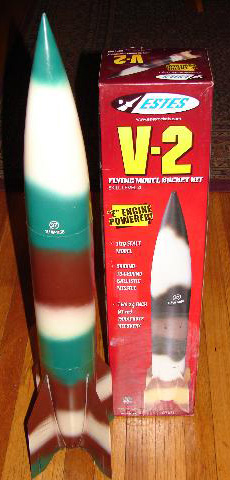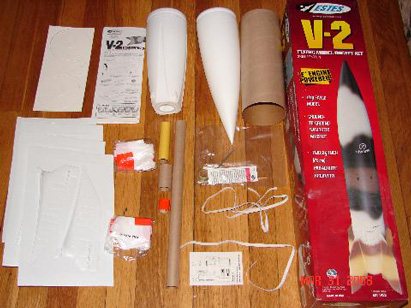| Construction Rating: | starstarstarstarstar |
| Flight Rating: | starstarstarstarstar_border |
| Overall Rating: | starstarstarstarstar |
| Diameter: | 3.94 inches |
| Length: | 33.50 inches |
| Manufacturer: | Estes  |
| Skill Level: | 4 |
 Brief:
Brief:
The Estes V-2 "E" Engine Powered kit aka Maxi V-2 is the latest version of the original Model No. 1267 Maxi
V-2 which was produced from 1974-1981. I had that original kit way back in the day and it was by far my favorite rocket
then just as it is now. This newest version (now also OOP) is setup with a 24mm motor mount capable of holding a D or E
engine. It utilizes two 24" parachutes, one for the main body and one for the large nose cone.
Construction: The kit includes::
- Body tube BT-101
- Body tube - BT-50 (serves as engine mount & Stuffer tube)
- Body tube - BT-52 (slips over engine hook and BT-50)
- Nose Cone - PNC-101F
- Tail cone
- 4 Fin sheets (two fins halves on each sheet
- Yellow spacer tool
- Engine hook
- Orange Spacer (for E to D engine usage)
- Green engine block
- Launch Lug
- Wood dowel 1/2" x 6"
- Shock cord 1/4" x 18"
- Shock cord 1/4" x 36"
- Die cut ring set
- Decal sheet
 The fin construction was challenging but I followed the instructions and things went smoothly. Once
I had all fins glued together I just took my time sanding, filling and each one came out great. Gluing the four
completed fins to the boat tail was a snap.
The fin construction was challenging but I followed the instructions and things went smoothly. Once
I had all fins glued together I just took my time sanding, filling and each one came out great. Gluing the four
completed fins to the boat tail was a snap.
Finishing:
PROs: The paint scheme I chose was basically similar to the box cover picture so painting was very easy to do. I used
green, almond and brown paint to give the rocket the desired look.
CONs: None that I can think of.
Construction Rating: 5 out of 5
Flight:
This rocket requires the Estes E-Launch Pad since it's big and heavy. It also takes a good deal of wadding if you
don't want your parachutes burned during ejection.
For the first flight I used an E9-4 engine that a friend of mine had laying around. That engine choice proved to be very costly. I put the V-2 on the pad, hooked up the clips and stood back with camera in hand to capture the launch. There were more than a few folks on hand to see the launch; the countdown reached zero the button was depressed. The engine roared to life. However as it did it blew the nozzle out and a great stream of fire poured down onto the blast deflector and up around the rocket.
For a moment, I was surprised and didn't move towards the rocket right away. By the time time I grabbed it up and away from the blast deflector the lower fins were burned and twisted. The bottom of the boat tail was also burned through in one place but not otherwise melted. I guess that engine had been sitting around too long and perhaps the conditions it sat in weren't optimal. I called Estes and they were kind enough to ship me a new set of fins. I cut the old ones off of the rocket and applied the new ones. It was a repeat of the first fin build and after some touch up paint the V-2 was ready to go again.
On the next flight I used a D12-3. This time the V-2 lifted off slowly and gained altitude. It didn't go straight up. It traveled at an angle. I think it only got to 150 feet or so and ejection was far too close to the ground for my liking. It was still a very cool launch and recovery via the two huge chutes was done without damage.
I then sent it up on an E9-4 and this time the rocket healed over at about 80-90 feet or so and travelled cruise missle style until it ejected only about 25 feet or so from the ground. The very tip of the nose cone chipped off when it hit a concrete road but other than that no damage resulted. The Estes E9-4 is NOT the engine for this rocket. For that matter neither is the Estes D12-3.
Additional D12-3 flights were similar to the first D12-3 flight so I put the V-2 on the shelf. The V-2 looks great on display! It will fly again, but only on Aerotech E and maybe F engines.
Recovery:
PROs: It's a great looking rocket on display, on the pad and as it lifts off. It's slow and majestic and definitely
commands attention.
CONs: The two recommended engines fall far short of being able to deliver the power or speed needed to give this
wonderful rocket a decent flight.
If you are lucky enough to find one of these I suggest going with a larger engine than either of those recommended by Estes. I also recommend a long launch rod since it will keep the rocket on track longer while it is building up speed.
Flight Rating: 4 out of 5
Summary:
Out of all of the rockets that I have built over the years this is my absolute favorite. Rebuilding this rocket after
the fire was almost as much fun as building it the first time. I look forward to flying it on larger more powerful
engines in the future.
Overall Rating: 5 out of 5
Other Reviews
- Estes V-2 (E-motor Version) By Frank Casey
Brief: Large Mid-engine rocket with dual parachutes. Construction: The model came in a huge box. It was dented but there was no damage. Parts in the kit: Nose cone Shock cords Parachutes Engine tube holder Engine tube Tail cone Four fins Engine hook Cardboard adapter ring to use with D motors Instructions The instructions are easy to follow and ...
- Estes V-2 (E-motor Version) By Brian Jarchow
Brief: Single state, 1:19.5 scale model of the German V2 ballistic missile. The only skill level 4 kit Estes currently sells. The kit comes with plastic nose and tail cones, four plastic sheets of fin, a short 4" body tube, a BT-50 for the engine, centering rings, two 24" parachutes, and the usual motor retention stuff. Also, some decals for a more scale appearance. When I first started on ...
 |
 |
Flights
 |
 |